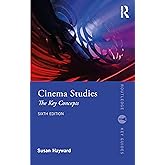Buy new:
$55.27$55.27
Ships from: Amazon Sold by: Hope's Ark
Save with Used - Good
$13.12$13.12
Ships from: Amazon Sold by: Tome Dealers

Download the free Kindle app and start reading Kindle books instantly on your smartphone, tablet, or computer - no Kindle device required.
Read instantly on your browser with Kindle for Web.
Using your mobile phone camera - scan the code below and download the Kindle app.

Cinema Studies: The Key Concepts (Routledge Key Guides) 5th Edition
Purchase options and add-ons
Cinema Studies: The Key Concepts is essential reading for anyone interested in film. Providing accessible coverage of a comprehensive range of genres, movements, theories and production terms, this is a must-have guide to a fascinating area of study and arguably the greatest art form of modern times.
Now fully revised and updated for its fifth edition, the book includes entries on topics such as:
- Acting
- Audience
- CGI
- Convergence
- Cult cinema
- Digitisation and globalization
- Distribution
- Experimental film
- Transnational cinema
- World cinemas
- ISBN-101138665770
- ISBN-13978-1138665774
- Edition5th
- Publication dateAugust 10, 2017
- LanguageEnglish
- Dimensions5.43 x 1.42 x 8.5 inches
- Print length616 pages
There is a newer edition of this item:
Discover the latest buzz-worthy books, from mysteries and romance to humor and nonfiction. Explore more
Frequently bought together

Customers who viewed this item also viewed
Editorial Reviews
Review
‘Every film student would be well advised to have a copy of the revised and updated version of Susan Hayward’s Cinema Studies: The Key Concepts next to them as they progress through their course. It offers succinct and well-informed definitions of key terms within the field as well as providing a range of further sources for readers to pursue their own research interests.’
Dr Andy Willis, Reader in Film Studies, School of Arts and Media, University of Salford, UK
About the Author
Susan Hayward is Emeritus Professor of Cinema Studies at the University of Exeter. Her publications include Luc Besson (1998), French National Cinema (second edition, Routledge, 2005), Simone Signoret: The Star as Cultural Sign (2004), Les Diaboliques (2005), Nikita (2010) and French Costume Drama of the 1950s: Fashioning Politics (2010).
Product details
- Publisher : Routledge; 5th edition (August 10, 2017)
- Language : English
- Paperback : 616 pages
- ISBN-10 : 1138665770
- ISBN-13 : 978-1138665774
- Item Weight : 1.65 pounds
- Dimensions : 5.43 x 1.42 x 8.5 inches
- Best Sellers Rank: #1,961,227 in Books (See Top 100 in Books)
- #4,222 in Movie History & Criticism
- #6,246 in Communication & Media Studies
- #16,756 in Sociology Reference
- Customer Reviews:
Videos
Videos for this product

1:08
Click to play video
 Very Informative And Useful! Love It!
Very Informative And Useful! Love It!Top Tier Reviews

About the author

Discover more of the author’s books, see similar authors, read book recommendations and more.
Customer reviews
Customer Reviews, including Product Star Ratings help customers to learn more about the product and decide whether it is the right product for them.
To calculate the overall star rating and percentage breakdown by star, we don’t use a simple average. Instead, our system considers things like how recent a review is and if the reviewer bought the item on Amazon. It also analyzed reviews to verify trustworthiness.
Learn more how customers reviews work on AmazonTop reviews from the United States
There was a problem filtering reviews. Please reload the page.
- Reviewed in the United States on January 3, 2019College book.
- Reviewed in the United States on October 12, 2018Good
Top reviews from other countries
 Basil SealReviewed in the United Kingdom on May 26, 2018
Basil SealReviewed in the United Kingdom on May 26, 20185.0 out of 5 stars Five Stars
A great update to the previous edition - an essential book of reference for Film and Media students.
 Karhausen LucienReviewed in the United Kingdom on June 6, 2020
Karhausen LucienReviewed in the United Kingdom on June 6, 20203.0 out of 5 stars this book is a must
This book is a unique masterpiece listing the fundamental concepts of cinema. Unfortunately, the author manifests a lack of sufficient familiarity with the world of cinema. For example, she correctly qualifies Brigitte Bardot as a sex-goddess comparable to sex-symbols such as Marilyn Monroe or Ava Gardner; but she then identifies them with Sophia Loren who, unknown to her, is one of the greatest twentieth century movie actresses, dramatic (Blood Feud), tragic (Two Women) , melodramatic (I Girasoli) etc. Italian cinema also remains limited to neo-realism, ignoring Michelangelo Antonioni with Monica Vitti's l'Avventura, or Federico Fellini, which she categorises erroneously as neo-realists. Italian cinema as been one of the greatest moments of the twentieth century art history. Furthermore, why twelve pages on psychoanalysis and not a word about cogntive theory, a discipline that is much more scientific, actual and relevant as shown by Gregory Currie?














